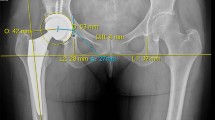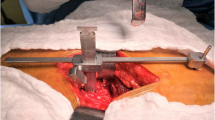Abstract
Leg length discrepancy following total hip replacement (THR) can contribute to poor hip function. Abnormal gait, pain, neurological disturbance and patient dissatisfaction have all been described as a result of leg length inequality after THR. The purpose of this study was to determine whether the use of computer navigation in THR can improve limb length restoration and early clinical outcomes. We performed a matched-pair study comparing 48 computer-assisted THR with 48 THRs performed using a traditional freehand alignment method. The same implant with a straight non-modular femoral stem was used in all cases. The navigation system used allowed the surgeon to monitor both acetabular cup placement and all the phases of femoral stem implantation including rasping. Patients were matched for age, sex, arthritis level, pre-operative diagnosis and pre-operative leg length discrepancy. At a minimum follow-up of six months, limb length discrepancy was measured using digital radiographs and a standardised protocol. The number of patients with a residual discrepancy of 10 mm or more and/or a post-operative over-lengthening were measured. The clinical outcome was evaluated using both the Harris Hip Score and the normalised Western Ontario and McMaster Universities (WOMAC) Arthritis Index. Restoration of limb length was significantly better in the computer-assisted THR group. The number of patients with a residual limb length discrepancy greater than 10 mm and/or a post-operative over-lengthening was significantly lower. No significant difference in the Harris Hip Score or normalised WOMAC Arthritis Index was seen between the two groups. The surgical time was significantly longer in the computer-assisted THR group. No post-operative dislocations were seen.





Similar content being viewed by others
References
Barrak RL (2003) Dislocation after total hip arthroplasty: implant design and orientation. J Am Acad Orthop Surg 11:89–99
Bellamy N (2002) WOMAC: a 20-year experiential review of a patient-centered self-reported health status questionnaire. J Rheumatol 29:2473–2476
Braun A, Lazovic D, Zigan R (2007) Modular short-stem prosthesis in total hip arthroplasty: implant positioning and the influence of navigation. Orthopedics 30(10 Suppl):S148–S152
Clark CR, Huddleston HD, Schoch EP 3rd, Thomas BJ (2006) Leg-length discrepancy after total hip arthroplasty. J Am Acad Orthop Surg 14(1):38–45
Confalonieri N, Manzotti A, Montironi F, Pullen C (2008) Leg length discrepancy, dislocation rate, and offset in total hip replacement using a short modular stem: navigation vs conventional freehand. Orthopedics 31(10 Suppl 1):pii:orthosupersite.com/view.asp?rID=35541
Crowe JF, Mani VJ, Ranawat CS (1979) Total hip replacement in congenital dislocation and dysplasia of the hip. J Bone Joint Surg Am 61(1):15–23
Gandhi R, Marchie A, Farrokhyar F, Mahomed N (2009) Computer navigation in total hip replacement: a meta-analysis. Int Orthop 33(3):593–597
Gofton JP (1971) Studies in osteoarthritis of the hip. IV. Biomechanics and clinical considerations. Can Med Assoc J 104(11):1007–1011
Haaker RGA, Tiedjen K, Ottersbach A, Rubenthaler F, Stockheim M, Stiehl JB (2007) Comparison of conventional versus computer-navigated acetabular component insertion. J Arthroplasty 22(2):151–159
Havelin LI, Engesaeter LB, Espehaug B, Furnes O, Lie SA, Vollset SE (2000) The Norwegian Arthroplasty Register: 11 years and 73,000 arthroplasties. Acta Orthop Scand 71:337–353
Kalteis T, Handel M, Bäthis H, Perlick L, Tingart M, Grifka J (2006) Imageless navigation for insertion of the acetabular component in total hip arthroplasty: is it as accurate as CT-based navigation?. J Bone Joint Surg 88(2):163–167
Kalteis T, Handel M, Herold T, Perlick L, Baethis H, Grifka J (2005) Greater accuracy in positioning of the acetabular cup by using an image-free navigation system. Int Orthop 29(5):272–276
Kellgren JH, Lawrence JS (1957) Radiological assessment of osteo-arthrosis. Ann Rheum Dis 16:494–502
Konyves A, Bannister GC (2005) The importance of leg length discrepancy after total hip arthroplasty. J Bone Joint Surg Br 87(2):155–157
Jenny JY, Boeri C, Dosch JC, Uscatu M, Ciobanu E (2009) Navigated non-image-based positioning of the acetabulum during total hip replacement. Int Orthop 33(1):83–87
Lazovic D, Kaib N (2005) Results with navigated bicontact total hip arthroplasty. Orthopedics 28(10 Suppl):S1227–S1233
Lazovic D, Zigan R (2006) Navigation of short-stem implants. Orthopedics 29(10 Suppl):S125–S129
Mainard D (2008) Navigated and nonnavigated total hip arthroplasty: results of two consecutive series using a cementless straight hip stem. Orthopedics 31(10 Suppl 1): pii:orthosupersite.com/view.asp?rID=35528
Malik A, Maheshwari A, Dorr LD (2007) Impingement with total hip replacement. J Bone Joint Surg Am 89:1832–1842
Matsuda K, Nakamura S, Matsushita T (2006) A simple method to minimize limb-length discrepancy after hip arthroplasty. Acta Orthop 77(3):375–379
Nogler M, Kessler O, Prassl A, Donnely B, Streicher R, Sledge JB, Krismer M (2004) Reduced variability of acetabular cup positioning with use of an imageless navigation system. Clin Orthop Relat Res 426:159–163
Lakshmanan P, Ahmed SM, Hansford RG, Woodnutt DJ (2008) Achieving the required medial offset and limb length in total hip arthroplasty. Acta Orthop Belg 74:49–53
Paratte S, Argenson JN (2007) Validation and usefulness of a computer-assisted cup-positioning system in total hip arthroplasty. A prospective, randomized, controlled study. J Bone Joint Surg Am 89(3):494–499
Parvizi J, Sharkey PF, Bissett GA, Rothman RH, Hozack WJ (2003) Surgical treatment of limb-length discrepancy following total hip arthroplasty. J Bone Joint Surg Am 85-A(12):2310–2317
Renkawitz T, Sendtner E, Grifka J, Kalteis J (2008) Accuracy of imageless stem navigation during simulated total hip arthroplasty. Acta Orthop 79(6):785–788
Renkawitz T, Schuster T, Herold T, Goessmann H, Sendtner E, Grifka J, Kalteis J (2009) Measuring leg length and offset with an imageless navigation system during total hip arthroplasty: is it really accurate? Int J Med Robot 5(2):192–197
`Rubash HE, Parvataneni HK (2007) The pants too short, the leg too long: leg length inequality after THA. Orthopedics 30:764–765
Sarin VK, Pratt WR, Bradley GW (2005) Accurate femur repositioning is critical during intraoperative total hip arthroplasty length and offset assessment. J Arthroplasty 20(7):887–891
Sathappan SS, Teicher ML, Capeci C, Yoon M, Wasserman BR, Jaffe WL (2007) Clinical outcome of total hip arthroplasty using the normalized and proportionalized femoral stem with a minimum 20-year follow-up. J Arthroplasty 22(3):356–362
Shiramizu K, Naito M, Shitama T, Nakamura Y, Shitama H (2004) L-shaped caliper for limb length measurement during total hip arthroplasty. J Bone Joint Surg Br 86:966–969
Takigami I, Itokazu M, Itoh Y, Mtasumoto K, Yamamoto T, Shimizu K (2008) Limb-length measurement in total hip arthroplasty using a calipers dual pin retractor. Bull NYU Hosp Jt Dis 66(2):107–110
White TO, Dougall TW (2002) Arthroplasty of the hip. Leg length is not important. J Bone Joint Surg Br 84(3):335–338
Wixson RL (2008) Computer-assisted total hip navigation. Instr Course Lect 57:707–720
Wylde V, Whitehouse SL, Taylor AH, Pattison GT, Bannister GC, Blom AW (2009) Prevalence and functional impact of patient-perceived leg length discrepancy after hip replacement. Int Orthop 33(4):905–909
Author information
Authors and Affiliations
Corresponding author
Rights and permissions
About this article
Cite this article
Manzotti, A., Cerveri, P., De Momi, E. et al. Does computer-assisted surgery benefit leg length restoration in total hip replacement? Navigation versus conventional freehand. International Orthopaedics (SICOT) 35, 19–24 (2011). https://doi.org/10.1007/s00264-009-0903-1
Received:
Revised:
Accepted:
Published:
Issue Date:
DOI: https://doi.org/10.1007/s00264-009-0903-1




